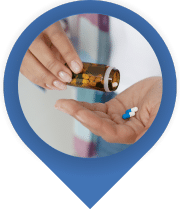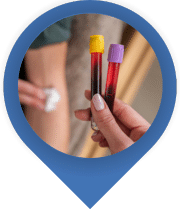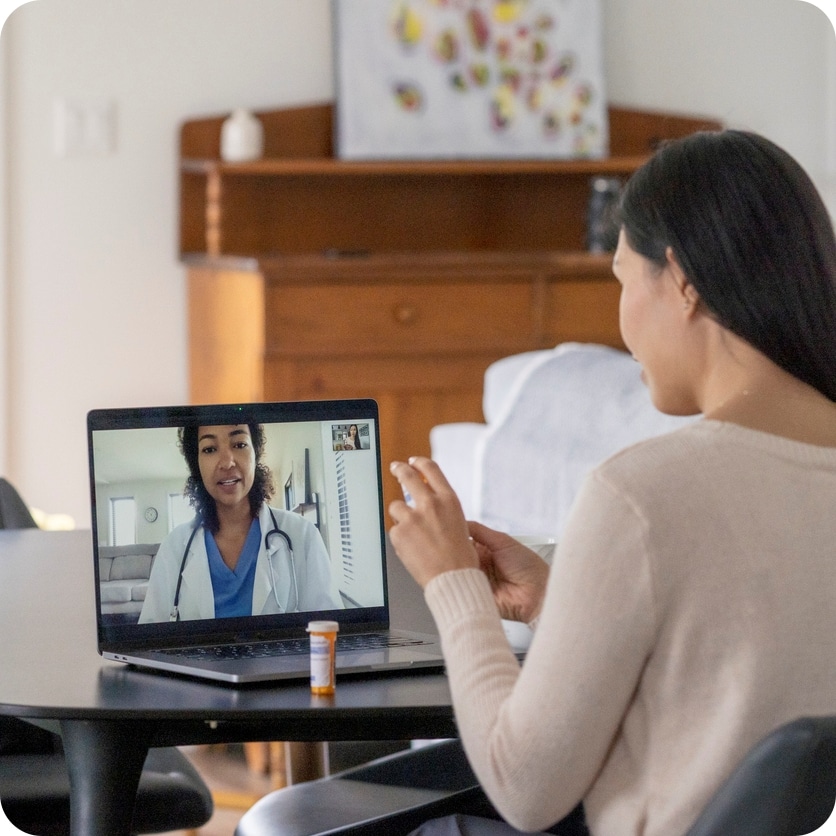The Latest Healthcare News
Check out our blog to learn more from our team about the latest medical advancements, health tips, and primary care news.

If you are experiencing a fever, sore throat, pain when swallowing, and swollen lymph nodes in the neck, you may have more than just a simple sore throat; you may have strep throat. At AllCare, our dedicated health professionals can offer a precise diagnosis and personalized treatment plan for your strep throat. We offer compassionate immediate and primary care services delivered by a team of experts who will prioritize your comfort at every step of your recovery.

Strep throat is a highly contagious bacterial infection caused by Group A Streptococcus bacteria, which makes your throat and tonsils feel sore, inflamed, and scratchy. It can be spread through respiratory droplets and direct contact with an infected person’s mucus. Strep throat represents only a small portion of sore throats, most sore throats are caused by viruses like the cold or flu a and b.
Strep throat is common in both adults and children. Symptoms often appear suddenly and can include:
We understand how uncomfortable strep throat can be for you or your child. If left untreated, it can lead to other serious health concerns, including:
AllCare offers a comprehensive approach to sore throat treatment. Here, you can undergo strep throat testing and start your treatment plan in one convenient location. Whether you require a thorough strep throat test, medications to help relieve your sore throat pain, or a consultation with a specialist, AllCare streamlines your healthcare journey by offering all these services during a single visit.

Oral antibiotics can help relieve the symptoms of strep throat, prevent complications, and reduce the risk of spreading the infection to others. We may also recommend over-the-counter medications, such as acetaminophen or ibuprofen, to alleviate sore throat pain and lower fever.

If allergic reactions are suspected, we may perform additional tests to rule out allergies that could cause throat pain.

This quick throat swab detects the bacteria that causes strep. Results are usually ready in under 15 minutes.

A sterile swab is gently rubbed against the back of the throat and tonsils to collect a sample of secretions. The sample is sent to a laboratory for bacterial culture. Results can take up to two days to be available.
A sore throat is a common symptom that can signal various conditions, including a cold, strep throat, or tonsillitis, but understanding the differences between these can help identify the cause.

Experience the convenience of telehealth appointments at AllCare. Our telemedicine services are designed to provide you with seamless access to healthcare without the need to leave your home. Whether you need an online doctor’s appointment for immediate or primary care, AllCare’s got you covered. With our online telehealth services currently available to individuals located in Virginia, Maryland, and Washington, D.C., you can connect with our experienced immediate and primary care physicians via secure video calls.
At AllCare, we are expanding our virtual healthcare access to all services previously offered in person. This includes:
Strep throat typically lasts between 3 to 7 days, but the exact duration depends on whether or not it is treated. Without treatment, symptoms such as a sore throat, fever, and swollen lymph nodes may persist for the full week or longer, with an increased risk of complications like rheumatic fever or kidney inflammation.
Note: When treated with antibiotics, strep throat symptoms usually improve significantly within 24 to 48 hours, and the infection is no longer contagious after about 24 hours of starting the medication.

Getting diagnosed and treated for strep throat is as easy as scheduling an appointment at AllCare, but you can also see a doctor at our facilities on a walk-in visit if needed. Here are a few simple steps for getting treated for strep throat:
If a person with strep throat coughs, laughs, or sneezes, they release droplets into the air. If you inhale these droplets, you can become infected. Additionally, if you touch something with strep bacteria on it, then touch your mouth or nose, share plates, glasses, or other eating utensils with an infected person, you can get strep throat.
Antibiotics play an important role in eliminating bacteria and preventing complications. It is important to complete the full course of antibiotics, even if your symptoms disappear. If you stop taking them as prescribed, bacterial remnants can remain, increasing the risk of recurrence or potentially developing rheumatic fever.
Additionally, some home remedies can help reduce the symptoms of strep throat, including gargling with salt water, avoiding spicy foods, drinking warm fluids, and getting plenty of rest.
Strep throat often shows up with sudden, intense symptoms that feel worse than a regular sore throat. You might notice a sharp, painful throat that makes swallowing difficult, red and swollen tonsils (sometimes with white spots), and a fever over 101°F. Swollen lymph nodes in your neck and tiny red spots on the roof of your mouth are also common. You could also have headaches, stomach pain, nausea, or even a rash.
Unlike a cold, strep throat usually doesn’t come with sneezing, coughing, or a runny nose. If these symptoms sound familiar, it’s a good idea to see a doctor. They can do a quick throat swab to check if it’s strep and, if needed, start you on antibiotics to help you feel better and stop the infection from spreading. Early treatment makes a big difference!
Strep throat is caused by a bacterial infection from Group A Streptococcus (Streptococcus pyogenes). This bacteria spreads easily from person to person through respiratory droplets when someone infected coughs, sneezes, or talks. You can also catch it by touching surfaces contaminated with the bacteria and then touching your mouth, nose, or eyes.
Strep throat is more common in crowded environments like schools, workplaces, or households, where close contact makes it easier for the bacteria to spread. It’s particularly contagious during the first 24-48 hours of infection, especially if left untreated.
Strep throat may eventually go away without treatment, but leaving it untreated is not recommended. While the symptoms might improve over time, untreated strep throat can lead to serious complications, such as rheumatic fever, kidney inflammation, or the spread of the infection to other parts of the body.
At AllCare, we’re proud to deliver exceptional primary and immediate care to residents across Virginia, Maryland, and Washington, D.C. From bustling city centers to serene suburban neighborhoods, our clinics are strategically placed for your convenience and care. Experience top-tier strep throat treatment in your community with AllCare, where your health is our priority.
Check out our blog to learn more from our team about the latest medical advancements, health tips, and primary care news.
Seasonal Affective Disorder (SAD) represents a significant mental health concern affecting approximately 5% of adults in the United States. This […]
Read More >Mammograms save lives. Early detection of breast cancer through proper screening will give a patient a remarkable 99% five-year survival […]
Read More >Most people are aware that diet, exercise, and genetics affect cholesterol levels. But can stress raise your cholesterol? The answer […]
Read More >Our related healthcare services extend beyond immediate care to include preventive care such as routine physical exams, chronic disease management for conditions like diabetes, and specialty care referrals for more complex health issues.